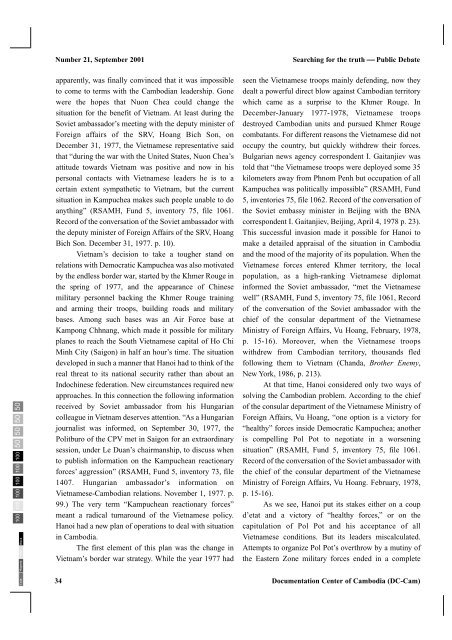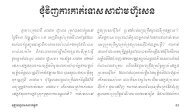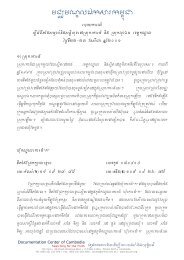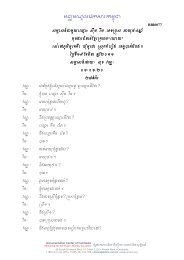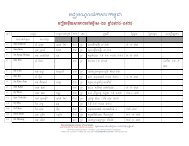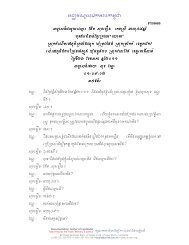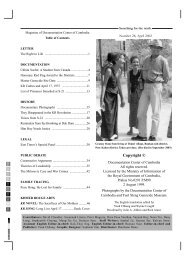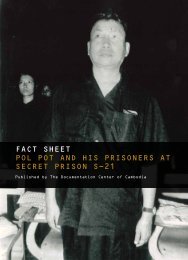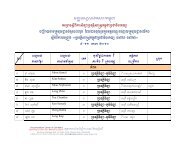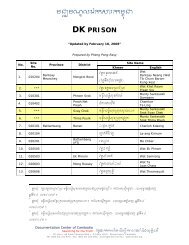Searching for the truth Issues 21 - Documentation Center of Cambodia
Searching for the truth Issues 21 - Documentation Center of Cambodia
Searching for the truth Issues 21 - Documentation Center of Cambodia
Create successful ePaper yourself
Turn your PDF publications into a flip-book with our unique Google optimized e-Paper software.
100 100 100 100 100 100 50 50 50 50<br />
Black<br />
Yellow<br />
Magenta<br />
Cyan<br />
Number <strong>21</strong>, September 2001<br />
apparently, was finally convinced that it was impossible<br />
to come to terms with <strong>the</strong> <strong>Cambodia</strong>n leadership. Gone<br />
were <strong>the</strong> hopes that Nuon Chea could change <strong>the</strong><br />
situation <strong>for</strong> <strong>the</strong> benefit <strong>of</strong> Vietnam. At least during <strong>the</strong><br />
Soviet ambassador’s meeting with <strong>the</strong> deputy minister <strong>of</strong><br />
Foreign affairs <strong>of</strong> <strong>the</strong> SRV, Hoang Bich Son, on<br />
December 31, 1977, <strong>the</strong> Vietnamese representative said<br />
that “during <strong>the</strong> war with <strong>the</strong> United States, Nuon Chea’s<br />
attitude towards Vietnam was positive and now in his<br />
personal contacts with Vietnamese leaders he is to a<br />
certain extent sympa<strong>the</strong>tic to Vietnam, but <strong>the</strong> current<br />
situation in Kampuchea makes such people unable to do<br />
anything” (RSAMH, Fund 5, inventory 75, file 1061.<br />
Record <strong>of</strong> <strong>the</strong> conversation <strong>of</strong> <strong>the</strong> Soviet ambassador with<br />
<strong>the</strong> deputy minister <strong>of</strong> Foreign Affairs <strong>of</strong> <strong>the</strong> SRV, Hoang<br />
Bich Son. December 31, 1977. p. 10).<br />
Vietnam’s decision to take a tougher stand on<br />
relations with Democratic Kampuchea was also motivated<br />
by <strong>the</strong> endless border war, started by <strong>the</strong> Khmer Rouge in<br />
<strong>the</strong> spring <strong>of</strong> 1977, and <strong>the</strong> appearance <strong>of</strong> Chinese<br />
military personnel backing <strong>the</strong> Khmer Rouge training<br />
and arming <strong>the</strong>ir troops, building roads and military<br />
bases. Among such bases was an Air Force base at<br />
Kampong Chhnang, which made it possible <strong>for</strong> military<br />
planes to reach <strong>the</strong> South Vietnamese capital <strong>of</strong> Ho Chi<br />
Minh City (Saigon) in half an hour’s time. The situation<br />
developed in such a manner that Hanoi had to think <strong>of</strong> <strong>the</strong><br />
real threat to its national security ra<strong>the</strong>r than about an<br />
Indochinese federation. New circumstances required new<br />
approaches. In this connection <strong>the</strong> following in<strong>for</strong>mation<br />
received by Soviet ambassador from his Hungarian<br />
colleague in Vietnam deserves attention. “As a Hungarian<br />
journalist was in<strong>for</strong>med, on September 30, 1977, <strong>the</strong><br />
Politburo <strong>of</strong> <strong>the</strong> CPV met in Saigon <strong>for</strong> an extraordinary<br />
session, under Le Duan’s chairmanship, to discuss when<br />
to publish in<strong>for</strong>mation on <strong>the</strong> Kampuchean reactionary<br />
<strong>for</strong>ces’ aggression” (RSAMH, Fund 5, inventory 73, file<br />
1407. Hungarian ambassador’s in<strong>for</strong>mation on<br />
Vietnamese-<strong>Cambodia</strong>n relations. November 1, 1977. p.<br />
99.) The very term “Kampuchean reactionary <strong>for</strong>ces”<br />
meant a radical turnaround <strong>of</strong> <strong>the</strong> Vietnamese policy.<br />
Hanoi had a new plan <strong>of</strong> operations to deal with situation<br />
in <strong>Cambodia</strong>.<br />
The first element <strong>of</strong> this plan was <strong>the</strong> change in<br />
Vietnam’s border war strategy. While <strong>the</strong> year 1977 had<br />
34<br />
<strong>Searching</strong> <strong>for</strong> <strong>the</strong> <strong>truth</strong> ⎯ Public Debate<br />
seen <strong>the</strong> Vietnamese troops mainly defending, now <strong>the</strong>y<br />
dealt a powerful direct blow against <strong>Cambodia</strong>n territory<br />
which came as a surprise to <strong>the</strong> Khmer Rouge. In<br />
December-January 1977-1978, Vietnamese troops<br />
destroyed <strong>Cambodia</strong>n units and pursued Khmer Rouge<br />
combatants. For different reasons <strong>the</strong> Vietnamese did not<br />
occupy <strong>the</strong> country, but quickly withdrew <strong>the</strong>ir <strong>for</strong>ces.<br />
Bulgarian news agency correspondent I. Gaitanjiev was<br />
told that “<strong>the</strong> Vietnamese troops were deployed some 35<br />
kilometers away from Phnom Penh but occupation <strong>of</strong> all<br />
Kampuchea was politically impossible” (RSAMH, Fund<br />
5, inventories 75, file 1062. Record <strong>of</strong> <strong>the</strong> conversation <strong>of</strong><br />
<strong>the</strong> Soviet embassy minister in Beijing with <strong>the</strong> BNA<br />
correspondent I. Gaitanjiev, Beijing, April 4, 1978 p. 23).<br />
This successful invasion made it possible <strong>for</strong> Hanoi to<br />
make a detailed appraisal <strong>of</strong> <strong>the</strong> situation in <strong>Cambodia</strong><br />
and <strong>the</strong> mood <strong>of</strong> <strong>the</strong> majority <strong>of</strong> its population. When <strong>the</strong><br />
Vietnamese <strong>for</strong>ces entered Khmer territory, <strong>the</strong> local<br />
population, as a high-ranking Vietnamese diplomat<br />
in<strong>for</strong>med <strong>the</strong> Soviet ambassador, “met <strong>the</strong> Vietnamese<br />
well” (RSAMH, Fund 5, inventory 75, file 1061, Record<br />
<strong>of</strong> <strong>the</strong> conversation <strong>of</strong> <strong>the</strong> Soviet ambassador with <strong>the</strong><br />
chief <strong>of</strong> <strong>the</strong> consular department <strong>of</strong> <strong>the</strong> Vietnamese<br />
Ministry <strong>of</strong> Foreign Affairs, Vu Hoang, February, 1978,<br />
p. 15-16). Moreover, when <strong>the</strong> Vietnamese troops<br />
withdrew from <strong>Cambodia</strong>n territory, thousands fled<br />
following <strong>the</strong>m to Vietnam (Chanda, Bro<strong>the</strong>r Enemy,<br />
New York, 1986, p. <strong>21</strong>3).<br />
At that time, Hanoi considered only two ways <strong>of</strong><br />
solving <strong>the</strong> <strong>Cambodia</strong>n problem. According to <strong>the</strong> chief<br />
<strong>of</strong> <strong>the</strong> consular department <strong>of</strong> <strong>the</strong> Vietnamese Ministry <strong>of</strong><br />
Foreign Affairs, Vu Hoang, “one option is a victory <strong>for</strong><br />
“healthy” <strong>for</strong>ces inside Democratic Kampuchea; ano<strong>the</strong>r<br />
is compelling Pol Pot to negotiate in a worsening<br />
situation” (RSAMH, Fund 5, inventory 75, file 1061.<br />
Record <strong>of</strong> <strong>the</strong> conversation <strong>of</strong> <strong>the</strong> Soviet ambassador with<br />
<strong>the</strong> chief <strong>of</strong> <strong>the</strong> consular department <strong>of</strong> <strong>the</strong> Vietnamese<br />
Ministry <strong>of</strong> Foreign Affairs, Vu Hoang. February, 1978,<br />
p. 15-16).<br />
As we see, Hanoi put its stakes ei<strong>the</strong>r on a coup<br />
d’etat and a victory <strong>of</strong> “healthy <strong>for</strong>ces,” or on <strong>the</strong><br />
capitulation <strong>of</strong> Pol Pot and his acceptance <strong>of</strong> all<br />
Vietnamese conditions. But its leaders miscalculated.<br />
Attempts to organize Pol Pot’s overthrow by a mutiny <strong>of</strong><br />
<strong>the</strong> Eastern Zone military <strong>for</strong>ces ended in a complete<br />
<strong>Documentation</strong> <strong>Center</strong> <strong>of</strong> <strong>Cambodia</strong> (DC-Cam)


